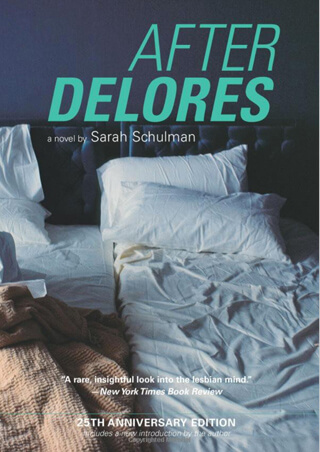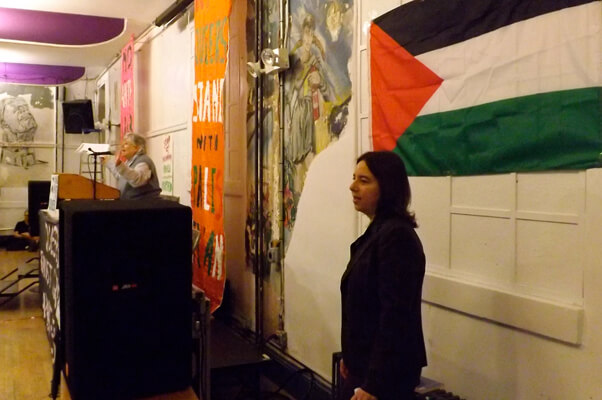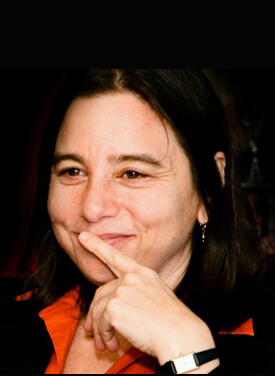Writer, artist, academic, and activist Sarah Schulman. | DREW STEVENS
At 58, the indefatigable lesbian writer, academic, and activist Sarah Schulman is producing a set of works astonishing for their diversity of thought and form as well as for their depth of feeling and content. What all these works have in common is that they speak directly to some of the most important issues of our time, especially for the the LGBT community. In an interview with London’s Guardian last March she was quoted saying, “I don’t do the one long slow idea. I do a hundred ideas.”
A year ago last June, she starred, alongside Jack Waters, in indie director Stephen Winter’s “Jason and Shirley,” his version of Shirley Clarke’s 1967 documentary “Portrait of Jason,” which the New Yorker called “one of this year’s finest offerings” when shown at BAMcinemaFest.
This past spring, her novel about queer friendship in Greenwich Village in the 1950s, “The Cosmopolitans,” earned starred reviews in both Publishers Weekly and Kirkus Reviews.
Sarah Schulman explores feelings, claims of abuse in an overdetermined world
And now, this month Arsenal Pulp Press is publishing her new non-fiction book, “Conflict Is Not Abuse: Overstating Harm, Community Responsibility and the Duty of Repair.”
Schulman operates as a queer public intellectual, a position that seems to come naturally to her and that she has carved out for herself from within academia, while still retaining her bona fides as an artist and an activist.
Her new work is a provocative rethinking of intimate and civil discourse for a rapidly shrinking world. As globalism raises the tensions threatening longstanding geopolitical balances, the everyday impacts cause stress and spikes in anxiety in individual lives and relationships. Schulman’s new work is a rallying cry for civil engagement and engaged civility.
ARSENAL PULP PRESS
The major premise of the book is that our society has developed the habit of overstating harm. In both intimate relationships and even between governments, those in positions of power will often claim that they are being hurt, when in fact, the opposite is so. This has become so pervasive that we are now in a state of confusion in which we confuse, sometimes honestly, sometimes cynically, any experience of conflict as an abuse scenario.
Themes in her new book particularly echo two earlier works by Schulman: 2009’s “Ties That Bind: Familial Homophobia and Its Consequences,” which shows how families scapegoat gay members, and “Israel/ Palestine and the Queer International,” from 2012.
Schulman spoke recently with Gay City News about the new book and her unique position in queer public life.
CHRISTOPHER MURRAY: What sparked your writing the new book?
SARAH SCHULMAN: Looking back, I guess I’ve been writing it my whole life. Even my first book, a detective one, is all about who’s got the power. Grace Paley said writers pick their themes when they are young and develop them all their lives.
I honed in on some of the themes when I wrote “Ties That Bind.” In that book I even had to coin the phrase “familial homophobia,” because there was no word for it. And when I was writing it, I realized the homophobic family is a negative group relationship and that they depict the gay person as the problem, as a threat or as someone who is harming them, but actually they are the problem. Understanding that reversal was an important door that opened for me.
When I wrote the book on Palestine, the whole book was an exercise in self-criticism. It was my first time writing from a supremacy position. It was informative for me to take that on and begin the process of undoing that. Throughout this book, I am constantly showing myself as wrong and making mistakes, and that’s something that I learned in the Palestine book.
I observe the dynamic of overstating harm in every level of human relationship. There is an abdication of responsibility to change our self-concept, and instead there is an escalation of accusation toward the other party. This creates a reinforcement of negative groups, not necessarily people doing it consciously, but we’re part of groups that encourage us not to be self-critical.
CM: How is it that this plays out in both micro and macro relations? How is family shunning mirrored in global relations?
SS: Because society is created by people. I explain it step by step through the book. It starts out with cliques — someone is identified as the scapegoat and we ban and shun them. Families are often a construction in which loyalty is defined by hurting other people. I look at the larger social systems and I can see that race is a family system. Class, nation, they are literally based on family, so it’s not much of a leap to when a family scapegoats one member — or unites by scapegoating an outsider — to then show that the national group that that family belongs to does the same thing.
CM: Why do you place such stress on talking together in person as such an important part of the solution?
SS: To speak, in person, has become a radical expectation and can even sometimes be considered abuse or harassment. But it’s in person that people change. So, if you refuse to be in person you refuse change.
CM: Is that kind of refusal of engagement based on immaturity or trauma, or is it merely cynical?
SS: People are scapegoated by others acting from a place of supremacy and ideology or [those scapegoating] are traumatized. Both have a refusal to accept opposition, even though it’s for different reasons. The supremacist feels entitled to refuse other peoples’ perspective, and, interestingly, traumatized people who are not in recovery often find other people unbearable because they themselves are so fragile. When you are on the receiving end, it feels the same whether it comes from someone acting out of supremacy or from a traumatized person shutting down conversation.
CM: Does it make a difference to know that the shunning is coming from a place of defensiveness due to someone’s trauma history?
SS: First of all, they would have to be aware of the trauma history. If that’s on the table, you’re in a good spot, but usually when you are being blamed for raising someone’s anxiety based on their previous experience, neither side is necessarily aware that that’s what is going on. That’s when good friends and families and healthy societies can help people to go and question themselves.
CM: You have an almost Good Samaritan model of the need in these conflicts for a third party interventions. You think it’s helpful?
SS: It’s more than that, it’s necessary. I think it should be the status quo, it shouldn’t be exceptional. It take courage to intervene. There is a loss involved. Intervening when someone is being scapegoated, you risk losing cultural currency. And that can be with a clique or with a nation. If you look at people who support Palestine, there’s been a lot of disenfranchising. That’s why we need more of us who understand that one of our primary responsibilities as human beings is to interrupt injustice.
CM: What impact do you hope the book will have?
SS: I don’t know, this is just starting. I don’t know how it will be received and what will be retained. I do say in the beginning of the book, this is not about proof and me being right, it’s not evidence. All I’m trying to do is stimulate new knowledge in the future. I am very clear that I am not an academician or practitioner, I’m an artist.
CM: Where did you get your identity as an artist?
SS: I have no idea. I have a calling or something. I’m a natural. People ask me every day how do you do all this? I have a freakish output. I’ve talked to some other people about this — like [gay science fiction author] Samuel R. Delany, but it’s easy for us and there has to be some kind of biological reason. I do think I make medicine out of poison. I think that’s what artists do. My job is to try to see the invisible structure of the apparatus of enforcement. If we can articulate how we see this abandonment of the vulnerable, then the structure becomes obvious. It’s only when it is mysterious that it is so frightening
CM: What give you the most hope?
SS: I’m a very optimistic person. I wouldn’t be doing this if I thought it was a waste of time. I always think positive change is possible, and I’m surprised when there are problems. You know, I’m a teacher. Over time for you to walk into that classroom, you’ve got to believe they can get it right.
CM: What nourishes and sustains you?
SS: Like, everything. I don’t do anything that I don’t enjoy.
CONFLICT IS NOT ABUSE: Overstating Harm, Community Responsibility and the Duty of Repair | By Sarah Schulman | Arsenal Pulp Press | $19.95 | 288 pages




































